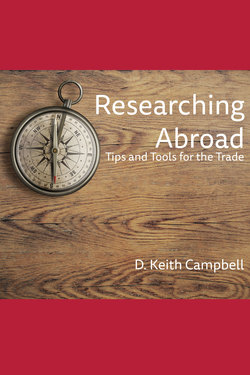Читать книгу Researching Abroad - D Keith Campbell - Страница 4
ОглавлениеPREFACE
Before I moved to Shanghai, many wise teachers and writers sacrificially shared with me from their experiences about life abroad. “Learn the language quickly,” they insightfully advised. “Immerse yourself in the culture. Find a support group. Expect and prepare for culture shock. Be patient with others. Laugh at yourself often.” A particularly excellent resource full of such advice, and one that serves as a complementary companion to my work, is Michael H. Romanowski’s and Teri McCarthy’s, Teaching in a Distant Classroom: Crossing Borders for Global Transformation (IVP Books, 2009). I remain indebted to Romanowski, McCarthy, and so many others for their advice that helped me better transition to another country. However, one needed piece of advice specifically directed toward academicians serving internationally has fallen between the cracks—practical advice about how to research while living in a new and challenging environment.
Need for this advice set in quickly for me after settling into my new routine in China. After learning where to shop, meeting my colleagues, and preparing for classes, I turned my attention toward beefing up my recently completed doctoral dissertation for publication. Step one, I thought, was easy: navigate to some relevant web pages. Step two was unexpected: find out why I can’t navigate to these relevant web pages! And just like that, I was introduced to the so-called “Great Firewall of China,” China’s pervasive, and aggravatingly intrusive, internet censorship. Days of frustration later, I discovered ways to navigate around it. This turned out to be the first of many obstacles to my research abroad.
Sometimes I navigated these new obstacles with the grace of an Olympic diver. More times than I care to confess, however, my reactions were less than stellar. On a few occasions, I’m embarrassed to say, my dilapidated, but completely innocent, desk received unwarranted blows from this frustrated abuser. Some simple tips and tools for this Visiting Lecturer of New Testament, who simply wanted to research and write while living in a distant land, would have provided some much-needed solace. And, by extension, my desk would have also breathed a deep sigh of relief! My desire to help other researchers in similar, challenging situations is why I write this brief book.
I can’t take full credit for the advice that follows. After all, nothing in life is accomplished autonomously, including writing books. Many of my colleagues at Global Scholars (www.global-scholars.org), the organization I serve with, have lived and researched abroad much longer than I have. Their indirect contributions via conversations over the years weave through every page. Some of them provided input specifically related to this book. I deeply wish that I could mention all of these sacrificial scholars by name, but most serve (or, one day might serve) in undisclosed locations around the world. Simply mentioning their names in a book directed toward Christians could jeopardize their jobs and/or their well-being. I know who you are. More importantly, God knows who you are; and he will reward you accordingly. Thank you for your input! I can, however, publicly thank three wonderful colleagues: Katrina Korb, Senior Lecturer of Psychology and Education and Head of the Department of General and Applied Psychology at the University of Jos, Nigeria, offered wonderful insights from the perspective of someone who researches in Africa; Rhonda Campbell, my wife and Visiting Instructor of Oral English at Shanghai Normal University, gave invaluable input at various steps along the way; and Richard Alexander, Minister of Music and Children at Memorial Baptist Church in Norwood, North Carolina (U.S.A), kindly tweaked the final manuscript for me on a visit to Shanghai.
As you read the following tips and tools, you will quickly learn that I write as a Christian to other Christians. More specifically, for the task at hand, I write as an academic missionary to other academic missionaries, though the nature of my topic clearly makes it applicable across a wide range of religious and philosophical perspectives. (As an aside, I struggle at length with whether or not to use the term “missionary” since it is such a politically charged term in many locales around the world; I opted to retain it because most of my readers understand the term even if they would themselves prefer a different one and because it remains the simplest way to reference an important aspect of what we do). Long gone are the days when authors think that they can realistically write with a detached objectivity. Even with a topic as seemingly neutral as researching abroad, I would fool no one if I try to conceal my essential motive in writing this book: to serve God’s Kingdom as a believer in Jesus Christ—the resurrected messiah, redeemer of humanity, and sovereign Lord of our universe. For this reason, I dedicate this book to Jesus, who, aside from being God’s perfect missionary to humanity, commands us to love the Lord with our heart, soul, and mind!
